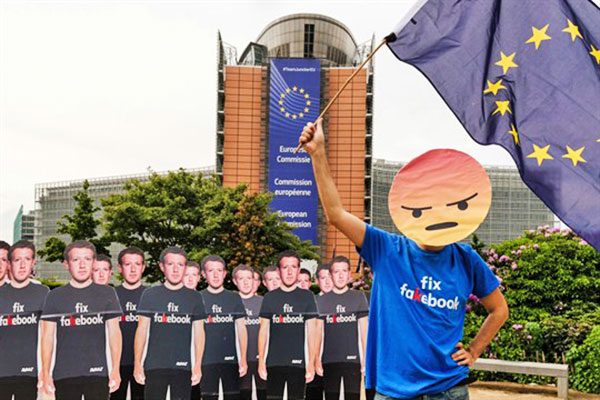|
by Katarina Kertysova from WorldPoliticsReview Website
as he stands next to life-sized Mark Zuckerberg cutouts to protest against fake Facebook accounts spreading disinformation, Brussels, May 22, 2018 (AP photo by Geert Vanden Wijngaert).
Despite the prior reluctance of several commissioners to name any specific foreign governments, the newly published policy document, called a Communication, singles out Russia for practicing information warfare and aims to establish what it calls "a European approach" to tackle these and other forms of hybrid interference.
This new approach will focus on improving
transparency, promoting media diversity, fostering credible sources
of information and devising long-term solutions to tackle
disinformation in Europe.
Its "EUvsDisinfo" campaign, which was launched by a unit known as the East StratCom Task Force with the aim to better forecast, address and respond to pro-Kremlin disinformation, has been criticized over the involvement of EU civil servants in fact-checking news sources and what is described as "myth-busting."
As critics have pointed out,
The controversy, and a similar one over proposed legislation in France to counter disinformation campaigns during electoral periods, raises a number of important questions.
In the end, governments have a role to play, but the
extent of that role remains a point of debate.
In response, the EU decided in 2015 to set up the East StratCom Task Force, a Brussels-based team of communications specialists from EU institutions and member states, housed within the European External Action Service, or EEAS, the EU's diplomatic service.
In addition to responding to disinformation activities, the Task Force was mandated to focus on communications campaigns in the Eastern Partnership countries:
...and to promote a more pluralistic and independent media
environment in the region.
The Task Force also manages the social media accounts @EUvsDisinfo, on Twitter, and EU vs. Disinformation, on Facebook, as well as the EUvsDisinfo website, which offers a searchable database of all identified cases of disinformation.
In
addition to these publicly accessible outputs, the Task Force offers
briefings to researchers, journalists and government officials
alike.
Without a dedicated budget and with an
insufficient number of staff, the bulk of its work depends on a wide
network of volunteers who report instances of disinformation from
more than 30 countries.
The Task Force has recently found itself under fire after having erroneously included three articles from Dutch media in its list of disinformation cases, before retracting its judgment.
Concerned publishing companies
launched legal proceedings against the
EEAS demanding a formal
correction. The incident led the Dutch parliament to pass a motion
in March urging the government to lobby for the abolition of the
EUvsDisinfo initiative.
The current debate puts the credibility of the Task Force's outputs at stake, without paying adequate attention to the positive impact its work has generated and the void its abolition would create.
So,
Jessikka Aro, a prominent Finnish journalist, warns that outsourcing the defense against disinformation campaigns to the public exposes them to Russia's info-ops, thereby running the risk of creating new victims.
As a journalist and a target of
information campaigns, Aro instead called on Western governments to
defend their citizens, including in the information domain.
Intelligence organizations can and should monitor outside
interference in the information space and, when appropriate, share
that information with citizens. Governments can also empower civil
society by providing funding for civil society initiatives and the
media, so that journalists can do their work properly, and by
providing adequate legal protection to those who challenge
disinformation efforts.
Addressing current methodologies for
fact-checking, as well as linguistic, staffing and budgetary
shortcomings, would yield better results than dismissing the work of
the Task Force on the basis of the mere fact that the information
provided by the myth-busting network is analyzed by civil servants.
The EU-wide guidelines, or "Code of Practice," on how to fight disinformation are to be published by July. They will help online platforms harmonize their approaches and provide clear guidance on how they can operate.
The establishment of an 'independent' European network of fact-checkers should improve credibility and trust in their work by ensuring the use of common working methods, exchange of best practices and the broadest possible coverage.
It remains to be seen whether the Task Force will
get a much-needed boost under the newly announced approach.
Anything
beyond guidelines and self-regulation is dangerous and could
backfire if the EU ends up closing down legitimate debate or is
successfully portrayed by its opponents as attempting to do just
that.
|


